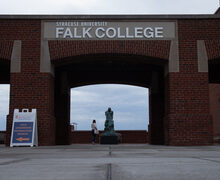Study finds correlation between TA race, student grades
A recent study found that student grades are positively correlated to their teaching assistant being of a similar race or ethnicity.
The study, conducted by the National Bureau of Economic Research, found that students earn higher grades from TAs who match the students’ race or ethnicity. TAs make up about 15 percent of the teaching staff in post-secondary education institutions, according to a Sept. 21 Inside Higher Ed article.
The authors of the study, a professor at the University of California, Davis and a professor at a school in Russia, analyzed grading patterns and TA demographics in economics classes at an unnamed university in California. Data was also taken from a 2014-15 audit study which recorded the attendance of optional TA discussion sections and office hours.
The research, released this month, also found that students were more likely to attend the optional discussion sections and go to office hours when TAs shared their race or ethnicity.
“I was confused when I first read the article because it sounded like it was implying favoritism on the part of the TA,” said Glenn Wright, the director of graduate school programs at Syracuse University, about his initial reaction to the study.
After further analysis of the study, titled “TAs Like Me: Racial Interactions Between Graduate Teaching Assistants and Undergraduates,” Wright said he concluded that students don’t get underserved by TAs; Rather, they work harder to earn their grades.
Under the supervision of a professor, TAs are given responsibilities that can directly impact student’s academic performance. TAs help host weekly discussion sections, hold office hours, tutor, proctor exams and grade assignments and exams.
In undergraduate programs, the racial composition has shifted from 82 percent of students in 1976 being white to 57 percent in 2013, according to the study.
“I would imagine the effect would be more pronounced with the minority population (at Syracuse University),” Wright said. “Especially in the case of non-native speaking undergrads who would benefit from their TA speaking their native language.”
At SU, international students make up about 10 percent of the university’s population, according to the SU website.
However, some people, like Yuxi “Cecelia” Zhou, do not agree with what the study finds.
Zhou, who is a first-year television, radio and film graduate student and TA, said she thinks the level of trust between students and their TAs and whether or not students find their TAs to be approachable is more important.
Eshetu Shiferaw, a sophomore computer science major, said a lot of his TAs aren’t the same race or ethnicity as him.
“It just matters how I connect to them and if they explain things that helps me understand,” Shiferaw said.
Published on September 27, 2015 at 9:11 pm
Contact Stacy: [email protected] | @StacyFernandezB




